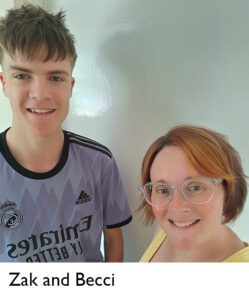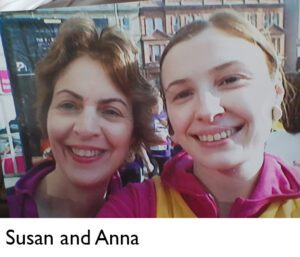 “It was really obvious from the moment he was born that something wasn’t right,” says Becci Smart. “He was born floppy, he was jittery, he was lethargic, he was irritable. He couldn’t suckle.”
“It was really obvious from the moment he was born that something wasn’t right,” says Becci Smart. “He was born floppy, he was jittery, he was lethargic, he was irritable. He couldn’t suckle.”
Becci had been taking sodium valproate when she fell pregnant unexpectedly with her son Zak. She was advised by her neurologist to take a higher dose of folic acid and that that would make the risks of epilepsy medication in pregnancy the same as in the general population.
However, Zak was born with foetal valproate syndrome (FVS) and a number of health challenges as a result.
Today, Zak lives with physical challenges, including malformations in his hands, hypermobility causing problems with his legs, flat feet, overcrowding of his teeth and “the classic features of someone affected by FVS.” He has also been diagnosed with autism spectrum disorder (ASD) and doesn’t like to be touched.
Thousands of families like Becci’s have been affected by the sodium valproate scandal. This medication, often very effective for managing epilepsy, carries a risk to babies if taken during pregnancy.
While this was known since the 70s, for decades it wasn’t communicated to women with epilepsy. Over the years, this omission has caused harm to thousands of babies and changed the course of life of thousands of families.
Anyone worried about valproate should continue to take their medication as prescribed and ask to speak to their specialist urgently.
View this post on Instagram
The right options
Susan Jamison took valproate while she was pregnant too, without being made aware of the risks to her babies. She had three children, all affected by valproate.
Susan explains that, looking back, her eldest daughter had signs at birth, including the classic facial features of FVS. She says she was hard to settle as a baby and her learning was affected. Her son also struggled growing up and attended a range of paediatric health services.
But she says her middle daughter, Anna, is worst affected. Anna has been diagnosed with ADHD and autism, and also has epilepsy and learning difficulties.
Susan says: “I feel, actually, still to this day, extremely angry about it. I carry an awful lot of guilt, because if I had the right options, I could have made different choices.”
View this post on Instagram
The gaps
Susan Cole’s younger daughter, Hannah, was also affected by sodium valproate. Susan explains: “I really distinctly remember in hospital trying to bathe her and I had to get my brother to help me hold her because she was so floppy that she couldn’t hold herself up. I know babies can’t hold their heads up, but she was like a dead weight.
“So obviously there was something wrong then and it just went on and I was never really told exactly what the problem was.
“At her first birthday party, a friend of mine came over and I said, ‘You know what, I’m a bit worried about her’, and she said, ‘I think you should be, I think you should see a doctor about it.’
“You can only see these things looking back, you can just see the gaps. You can just see the moments when you were in a doctor’s office or you can remember these times when people could have said things, but they didn’t.”
Over the years, without explanations or accountability from authorities, women have had to chase answers, campaign tirelessly and deal with intense guilt over what has happened to their children.
View this post on Instagram
Still waiting
Then, on 8 July 2020, the Independent Medicines and Medical Devices Safety Review was published by Baroness Julia Cumberlege. It was called ‘First Do No Harm’, and it looked into three medical scandals, one of which was sodium valproate.
In it, Baroness Cumberlege detailed “heart wrenching stories of acute suffering, families fractured, children harmed and much else”, as well as making recommendations for the government going forward.
One of these recommendations was around a redress for the affected families.
She said: “Patients have waited far too long for redress. Any scheme must be set up promptly.”
It’s been five years – to the day – since the report was published. People affected by valproate are still waiting for redress.
Last year, the Hughes report was published by the Patient Safety Commissioner, setting out options for financial and non-financial (such as housing, healthcare and social security) redress.
The government has not officially responded to the Hughes report. In response to a question to the health minister, the government said it is “carefully considering” the Hughes report, but that it is “not currently able to give a timeline for a response”.
The light at the end of the tunnel
 Epilepsy Action has called the lack of compensation after two reports a “scandal”, adding that this has “gone on long enough”.
Epilepsy Action has called the lack of compensation after two reports a “scandal”, adding that this has “gone on long enough”.
Rebekah Smith, Epilepsy Action chief executive, said: “It is a scandal that as far back as 35 years, thousands of women with epilepsy weren’t being told about the risks involved with taking valproate in pregnancy when evidence was mounting. These women have had to live with the reality of that for decades and the huge emotional and financial impact it has on their lives.
“It is also a scandal that two reports in the last five years have recommended that families be compensated for the ordeal and yet those affected are still waiting for the light at the end of the tunnel.
“These families don’t have another 35 years to wait for redress to happen. With each year that passes, it costs families affected around £30,000 a year to support their now adult children, with many needing 24-hour care.
“They need closure, the acknowledgement of how they were let down and the means to be able to move on with their lives. Many families are now in their 60s and 70s and are understandably very concerned about who will be there to look after their children when they have gone. It’s an extra worry they shouldn’t have to bear in a situation that has gone on long enough already.
“It’s hard enough for those living with an invisible condition such as epilepsy to feel heard and to be given the understanding they deserve. It’s time the government really sees them now and acts on the recommendations set out five years ago. It won’t erase the decades of damage the families have had to endure but it will give them – and most importantly their children – the hope they desperately need for the future.”
A stable future
 After so many years since the scandal began, a redress is not just a gesture people are asking for but is absolutely essential for families affected.
After so many years since the scandal began, a redress is not just a gesture people are asking for but is absolutely essential for families affected.
Becci says: “I sit and think about Zak’s future. I’m not going to be here forever. What is his future going to look like? What is his health going to look like in 10- or 15-years’ time if healthcare professionals are dismissing him now when I’m sat in the room with him? How is he going to manage when I’m not here?”
Becci explains that she lives with a lot of guilt, only made worse by the way she and her son are dismissed by healthcare professionals. She says: “Look at the harm that’s been caused to him, and nobody communicated this with me!
“All that did was compound all the guilt that I was already feeling as a parent. Because I did already feel guilty from the moment he was taken to neonatal. I felt guilty that I hadn’t been able to protect him from things like that.
“Why did no one tell me? Why am I having to fight for help for him? Why is no one else in my corner? Why is everybody just saying to me, ‘it’s your fault because you took sodium valproate’?
“I think, for me, a redress would just mean knowing Zak would be stable in the future. I don’t know if he’s ever going to be able to work, or live independently or do any of the things that his friends do right now.
“So, knowing that he’s got something there for when I’m not around or for when I’m older, when I can’t care for him, is really important to me.
“Compensation isn’t going to change what happened, but it can improve his quality of life.”
An acknowledgement
 Susan and Anna say there’s been a lot of suffering for the family due to the effects of valproate. For Susan, her family’s mental health has been one of the most impacted elements and they have really struggled throughout the years.
Susan and Anna say there’s been a lot of suffering for the family due to the effects of valproate. For Susan, her family’s mental health has been one of the most impacted elements and they have really struggled throughout the years.
The family has also faced missed opportunities. Susan explains: “I’ve never been able to work full-time, because of the children, so I’ve never had a good full income coming into the house. I would have loved to have done full-time work, but it wasn’t possible because the children needed me at home.”
Anna adds: “Watching my siblings and even the rest of my family, they’re incredibly smart and they’ve accomplished all these great things and, at times, it’s hard not to be sad that I could be like them.
“I even went to college in Lisburn. All that made mum very proud, and I have a great job [volunteering with Boots] and I’m happy about it, but I would have liked to accomplish more in life. I would have liked to go to university like my cousins.”
Susan says Anna will always have to live with her and will always need support. “Financially, for the children, they definitely need financial redress because parents are getting old. We won’t be around [forever] and the children definitely need the money so they can move on in life.
“I would love an acknowledgement of somebody saying, ‘Sorry, no, it wasn’t your fault. You didn’t get the right information. You should have got the right information, but we didn’t give it to you.’ And I’d love to know why they did not tell us.”
Redress with respect
Meanwhile for Susan, words are empty, and all she wants to see is helpful action that will help her and her family to support Hannah. Susan founded the organisation Valproate Victims to campaign for justice for the thousands of families affected by the valproate scandal.
From starting campaigning in 2002, Susan has delved into the science and the research, raised awareness with her local GP, built a legal case, attended meetings with government bodies and protested side by side with other affected families.
She says: “I’d rather they didn’t acknowledge mistakes were made and actually just gave us what we need, because that’s what matters. What matters is what we are provided with now in terms of financial and non-financial redress. Words mean absolutely nothing to me.
“The payment was proposed by the Patient Safety Commissioner in the Hughes report. But it’s taking far too long.
“We need redress with respect and we need to be part of the process of designing any redress scheme.”
If you have been affected by the valproate scandal, or you simply believe the people affected deserve justice and support, you can download our template letter to send to your local MP. You can also show your support by sharing Becci, Susan and Susan’s videos on social media and tagging Health Secretary Wes Streeting (@wesstreeting)




